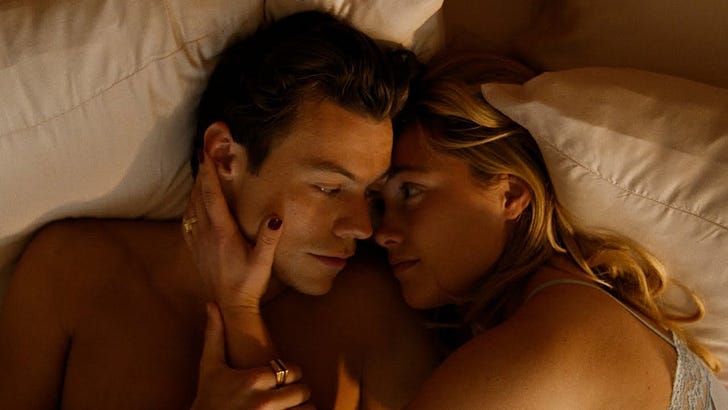I'm not worried. Are you?
Here's why you don't need to sweat "Don't Worry, Darling" even if you still don't get that ending. You're not alone.
Spoilers ahead
At 122 minutes (that’s 2 hours and 2 minutes), in a culture where the average human attention span is 8 seconds, Sophomore director Olivia Wilde who received wild praise for her first film, Booksmart, about 2 precocious high school seniors who attempt to live their best lives in one night, is experiencing the growing pains that come with the pressures of putting together a second film.
That second film, Don’t Worry, Darling, is such an abrupt Booksmart departure from the teen angst and story of friendship, awkward romances, and funny hijinks reminiscent of a late 90’s teenage screwball comedy like Can’t Hardly Wait or American Pie but with depth and a naught’s glow up, that it almost feels like it’s orbiting an entirely different universe, and lo and behold, it is.
The universe or set where Don’t Worry, Darling exists is a very posh and has perfected the 50’s style and flair of gorgeous cars, sexy, beautiful couples; California stark desert backdrop with rocky severe mountains; and cookie cutter “little boxes” type houses. This is a planned community and people never leave because it’s not “safe.”
Think about that for a second.
Men go to work and come home late. They aren’t allowed to talk about their work - only that it’s important work that is contributing to the “progress of materials.” Women are valued for their “discretion.” The are also left to their own devices during the day - cleaning the house, doing ballet, hanging out, and listening to long monologues by way of radio (?) broadcast in the homes, the subject of which often acts to reinforce submission and continuance to conform to these lives. (think Stepford wives).
The women on the surface seem happy but it also feels like a fragile happiness that could crack at any second. The main characters, played by Florence Pugh and Harry Styles, are a couple madly and passionately in love who demonstrate this love openly and many times a day. Pugh relishes being a happy housewife and Styles relishes coming home to her. It’s the stuff dreams are made of, right?
And that’s when things start to get bleak. The movie takes a turn. Alice (Pugh) is seeing weird Rorschach ink blots interspersed with images of dancer’s legs in symmetry. Symmetry is an important element of being in this community. She also witnesses what appears to be a mental breakdown of a former friend, Margaret who was alienated from the other women when she started to disrupt the status quo by asking questions.
A critical juncture in the film is when Alice sees Margaret slit her throat, effectively taking her own life and no one, including Jack believes her. From that point on the rift between Alice and Jack just goes deeper and deeper. In essence, the bleak here is that Alice is gaslit for a good portion of the film and that’s hard to bear because you know she’s right. This place is weird as [fill in the blank] and there is no one she can trust and no way to get out. She tries and just ends up back there.
Without disclosing too much, I can tell you that elements of this film reminded me of the sci-fi show, War of the Worlds, season 2, and with good reason. Visions and specks appear to Alice in her mind, things that aren’t happening but look like they are happening, things of this nature.
An indie favorite, Wilde is having a banner film festival season getting her film and most of the film’s actors (even the ones who didn’t get cast are being pretty vocal. We see you Shia LaBeouf) out there to promote the film, but has been more in the news for her relationship with Harry Styles and the dissolution of her marriage with fan darling Jason Sudeikis, of Ted Lasso lore. Not to mention, loose lips nanny-gate and Wilde’s “hellfire” response (and yes, I just linked over to an US Magazine article, I’m owning it.) Because how dare a mother behave this way.
And that’s a shame for many reasons, one of which is the double standard applied to women in film and where the media chooses to focus, but that’s fodder for another article. Because while this film is flawed and ok, let’s start with the run time, and the fact that there is no actual ending, it’s also wildly stylized and interesting to watch with shades of cultural depth. There was a moment probably 1:55 minutes in where I thought to myself, “Wow this movie is really going for broke” and I thought that with both a sentiment of admiration and also a sense of despair.
Was it disrupting too much of my sense of convention and tendency to follow rules? What this what happens when you blindly follow? Are all males bad? No, but this film definitely ends with some dissonance and discomfort in the deception and betrayal - all exacted my males cloaked in terms like “love” and wanting a “better life.” but ultimately concealing lies and telling half truths - all for purpose of companionship.
Doesn’t feel warm and fuzzy. It feels selfish. I can’t help but think Wilde is doing a bit of an about face to the audience, saying, “Let’s shake things up. Down with the patriarchy. Let me live my truth. Let me love who I’m gonna love. Who are you cuff me. Who are you to tell me otherwise.”
And you know what, I don’t really have a good response.






